An Introduction to Unschooling: Real Education
Good morning, afternoon and evening everyone! My name is Michael McGillicuddy and I am ready to introduce the way education should be. Before that, let me share a few of my most important thoughts:
My goal is to live in a peaceful and free world.
I will elucidate what that means in later posts. For now, I will say that I think I have found a way to get rid of the old hairy problems of war, poverty, slavery, and more. I’m thinking big and I will share my thoughts with you.
Over the next 12 months I plan on fulfilling a number of my dreams! I'm heading back to the USA to reconnect with my family. While there I want to host a conference of high-consciousness individuals focused on freedom and morality. Then it's to the premier freedom conference in the world...Anarchapulco 2019!
After that the fun begins! I will be taking a bus, car, plane, whatever transportation I can to travel through Central and South America to find our idyllic dream home.
I can't wait! I have been blessed to be able to do so much! And I plan on doing a lot more.
Now, our topic today is schooling vs. unschooling.
Schooling is the idea that education must be forced, occurring within specific time blocks, in a specific location, in an age-segregated environment, and with the goals and education materials decided by the teacher, with little input given to the students on what they would like to learn.
When you learn the origins and stated purpose of modern schooling: To create obedient workers, soldiers, government employees, and create a citizenry which thinks the same on major issues, the decision to seek an alternative is an easy one.

(We will learn more about this fascinating subject in a later post. For now, see John Taylor Gatto, 2-time New York Teacher of the Year's work)
You're reading this because deep down you love your child and want them to be happy. You will go through great lengths, endure temporary ridicule from less-enlightened parents (which will later turn to praise over what a smart child you have!)
Unschooling may be a new concept, so let's begin with a definition.
Unschooling is educating a child by allowing him or her to follow their own interests and passions, at their own pace.
Unschooling is not “un-educating.” Unschooling simply means not forcing children to learn what other people want them to learn.
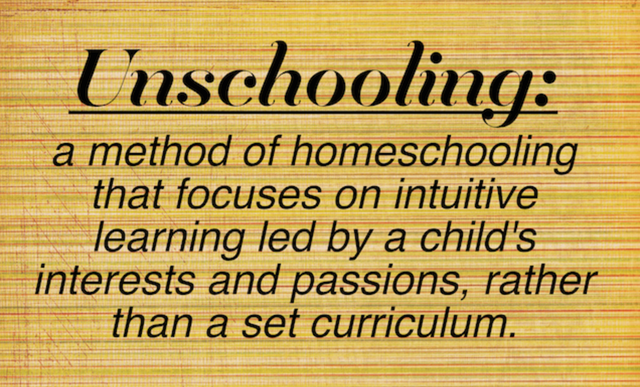
The most well-known advocate for unschooling is Dayna Martin. She has raised four unschooled children since 1999, written books on the subject, and been featured on television worldwide (Dr. Phil, Nightline, 60 Minutes: Australia, Oprah Winfrey, Jeff Probst, Fox News, The Today Show, Wife Swap, and more) for her unschooling expertise. She explains the essence of unschooling:
Learning is like breathing. It’s really easy and it’s really joyful and expansive and powerful and it’s also instinctual. The only thing that gets in the way of learning is when it’s forced and when it’s controlled and when it’s regulated and when it’s scheduled and graded and measured. That’s what screws up the natural process of learning that comes really joyfully and easily to kids.
-Dayna Martin, Unschooling Advocate
Unschooling is not for lazy parents. The parents themselves must be constantly educating themselves to help their children. The parents do not necessarily need to teach everything, but they must provide a life rich with educational resources for their children.
I can positively say that this idea works! It is rooted in truth. Using these methods as a teacher in China and the USA I can confidently say that they are much more effective and make you feel better than trying to force kids or students to learn something they're just not interested in.
How To Unschool Your Kids
So how do you do it? What's the right way to unschool your kids? Simply:
Treat the world as their classroom and life as their education
Expose them to a wide variety of topics. Pay attention to your children and find out what they are interested in. What do they want to learn more about?
When they tell you what that is, provide those educational resources for them.
If they like cooking, cook with them and teach them how to measure and do math. If they like science take them to the science center. If they're old enough, see if they would like to work there.
Find an apprenticeship for them, a teacher, a coach, and others who share their interests. And watch them soak up that information like a sponge.
Treat your kids with the respect you would give your best friend and they will flourish.
I can hear some of the programmed responses now:
***-But what if they miss certain "education windows"?
-What if they "fall behind" their schooled peers?
-What if they only play video games?***
Good questions, all. Are you ready to listen to solutions with an open mind?
It is possible your child may develop more slowly in certain areas than their peers (though they might also fly past their peers as school holds many bright minds back...).
If that happens, believe that your child will learn when they are ready to - just as they learned to walk and talk when they were ready.
If your baby was "behind" on his walking, would you stand him up by the shoulders and force him to take steps, only to watch him fall? Would you then scold him for his "Lack of effort" and remind him that he was "falling behind the others"?
What about speaking? If your child needed extra time to begin speaking, would you yell at them to “Start talking! You're not trying hard enough!" I hope not.
Growth? If your child was shorter than others, would you scold him for not growing fast enough? Would you condescendingly compare him to taller children and ask why he couldn't "be like them"?
The truth is that we are all different and we develop at different rates, both physically and mentally. We all have different interest and are NOT here to do the same thing. If your child sees a need, he will learn, and he will learn voraciously.
One unschooled child learned 12 years of math in 3 months.
What If He Always Plays Video Games?
For this one, it's important to look at the source of this behavior. If your student "always plays video games," then the truth is that he/she prefers escaping into a virtual reality rather than live in his/her current one.
For most children, their reality is:
School
Homework
Stress
Studying (things they're not interested in)
More homework
Stress
Feelings of inadequacy
School
"DO YOUR HOMEWORK!!!"
Study...
What do you think would happen if you changed your child's reality to:
Freedom
Exploration
Curiosity
Self-acceptance
Encouragement
Purpose
Meaning...
"What do YOU really want to learn?"
If that is your child's reality, do you really think they will still choose the empty flashes of a virtual game on a 3-inch screen?
Does It Really Work?
Like most new ideas (though not really new, some of history’s most revered men and women were unschooled and left to follow their passions. That will be the subject of another post), it can be a little confusing.
Here is an example of unschooling in action:
Dayna Martin’s eldest son Devin Martin took an interest in blacksmithing (making things from iron and other metal) in his early teens. His parents found him an apprenticeship with a local blacksmith. A few years later, he was making his own custom knives and swords and selling them.
Devin expanded and began making metal armor. He then taught himself to make his own clothes, especially clothing worn by Europeans of the Middle Ages. At 19 he had garnered such a reputation that a Viking-era film hired him to produce their costumes. He was paid $100/meter of fabric.
Were you making that kind of money at 19? Does school allow most 19 year olds to be that successful, forcing them to sit in brick buildings for 12 years, memorizing largely useless facts only to forget them after the test?
Devin is doing very well and most importantly, he is a happy teenager.
Some Common Questions
It’s natural to have questions about unschooling. Here are three of the most common unschooling questions…answered!
1. If children do not attend school, how can they be socialized with other children?
The United States has over 200,000 unschooled families. Many of them network and become fast friends. Furthermore, there are always weekends to spend time with other children, play sports, and other activities that schooled kids do. And since unschooled children do not have hours of homework or stressful tests, they can enjoy the company of their friends much more!
2. If children do not attend school, how will they be able to get a job and work?
Unschooled children do not perform well as worker bees: Unthinking people-robots who show up at the same time and do repetitive work day after day, year after year. Instead, unschooled children usually grow up to be free-thinking entrepreneurs! Because they are not schooled they have so much more time to follow their passions, increase their skillsets and begin working at a much earlier age than schooled children. Most unschoolers usually build successful businesses while their peers are still in school!
3. Aren’t unschooled children in a bubble? If they do not attend school, how will they adjust to society?
Unfortunately, it is schooled children who are the ones living in a bubble. School is NOT like the real world! This can come as a great shock to students who did well in school and then find that life after is not at all the same.
Unschoolers have no problem adjusting to society, because they are immersed in it! They are not sequestered inside a brick building only with other children their own age. Instead they’re outside socializing with all different ages, connected to those around them, and living in the real world.
Unschooling - Education's Natural Way.
Following our passions and dreams is how we are meant to learn and live. Asking a child to wait twelve years to follow their dreams and “begin life” is too long. As poet Langston Hughes said, “A dream deferred is a dream denied.”
Learning is as natural as breathing. Children do much better and are happier when given trust and the ability to focus on what they’re passionate about. We are not all meant to do the same thing.
We are waking up to this fact and things are changing. Unschooling is growing fast! And when forced schooling is a distant memory, society will be so much better, happier, and peaceful for it.
Hope you liked this article. If you want to talk further, leave me a comment or add my WeChat and we can talk!
-Michael McGillicuddy
Fujian, China
Further Reading
www.daynamartin.com
Radical Unschooling - A Revolution has Begun
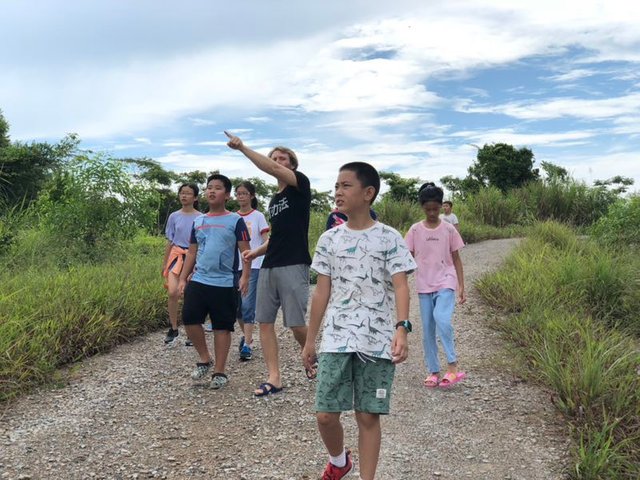
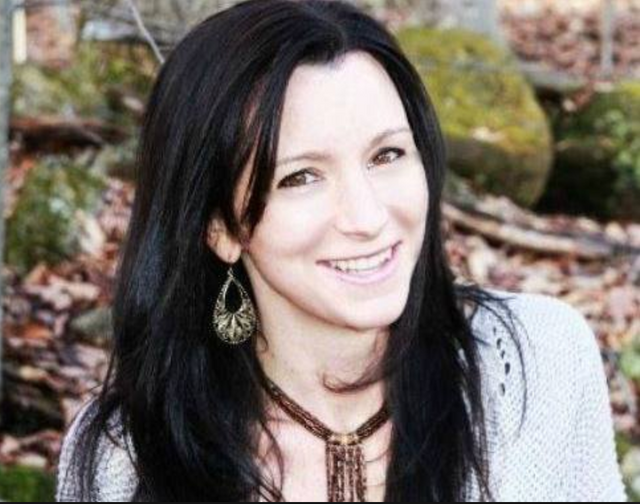
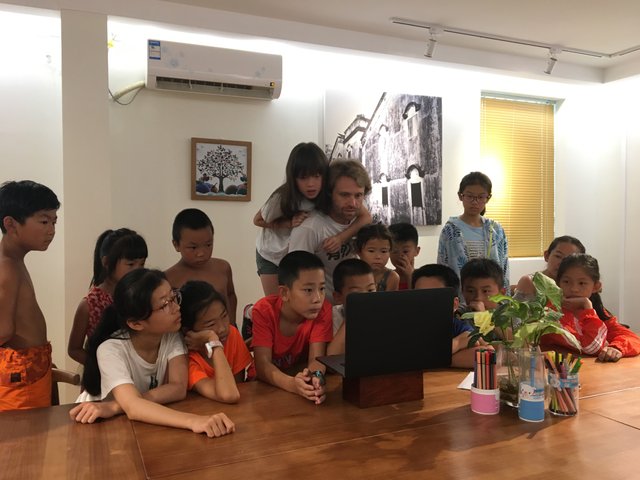
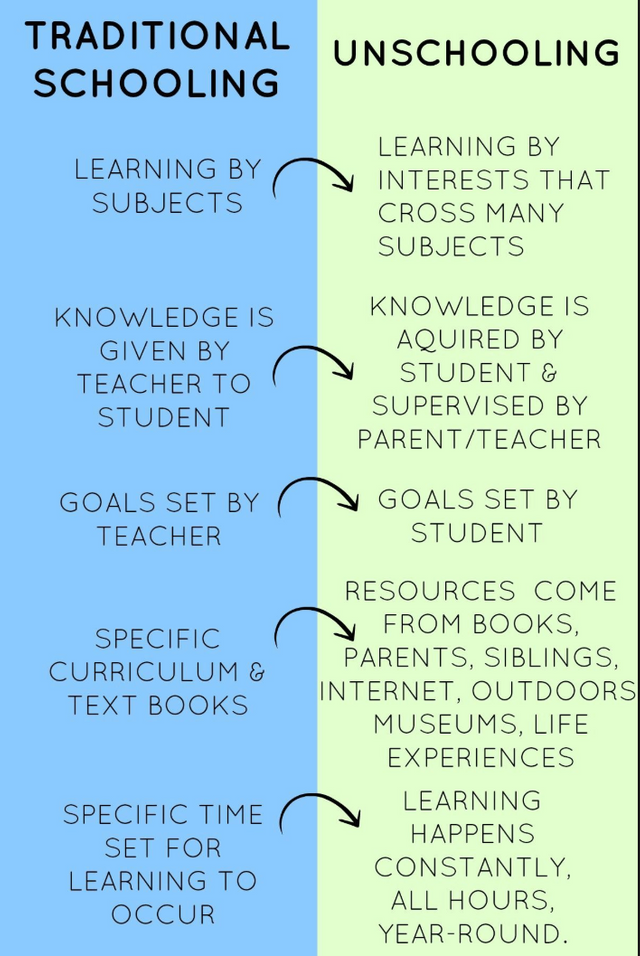


You're a fake dude! Stop riding the coattails of other people! I know you in real life and you're a fraud! Pay me back my ethereum that you're holding! More importantly, do something worth a damn in education with real students instead of writing articles pretending that you have real experience! You suck dude!